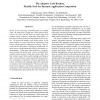Free Online Productivity Tools
i2Speak
i2Symbol
i2OCR
iTex2Img
iWeb2Print
iWeb2Shot
i2Type
iPdf2Split
iPdf2Merge
i2Bopomofo
i2Arabic
i2Style
i2Image
i2PDF
iLatex2Rtf
Sci2ools
110
click to vote
IPPS
2007
IEEE
2007
IEEE
The Adaptive Code Kitchen: Flexible Tools for Dynamic Application Composition
Driven by the increasing componentization of scientific codes, the deployment of high-end system infrastructures such as the Grid, and the desire to support high level problem solving primitives, application composition systems have become prevalent in computational science practice. We present the adaptive code kitchen which, as the name connotes, is a loose collection of capabilities to help realize complex adaptive composition scenarios. These include function interception, continuation modification, dynamic process checkpointing and rollback, and runtime recommendation. Using these broad primitives, a computational scientist can specify many ‘recipes’ of adaptivity as complete control systems around native object codes. Runtime systems support then enables loading and linking of native code components, monitoring of performance indicators, consulting a recommender system for algorithmic decisions, and dynamically updating application components in response to the recommendat...
Adaptive Code Kitchen | Adaptive Composition Scenarios | Distributed And Parallel Computing | IPPS 2007 | Problem Solving Primitives |
Related Content
| Added | 03 Jun 2010 |
| Updated | 03 Jun 2010 |
| Type | Conference |
| Year | 2007 |
| Where | IPPS |
| Authors | Pilsung Kang 0002, Mike Heffner, Joy Mukherjee, Naren Ramakrishnan, Srinidhi Varadarajan, Calvin J. Ribbens, Danesh K. Tafti |
Comments (0)

